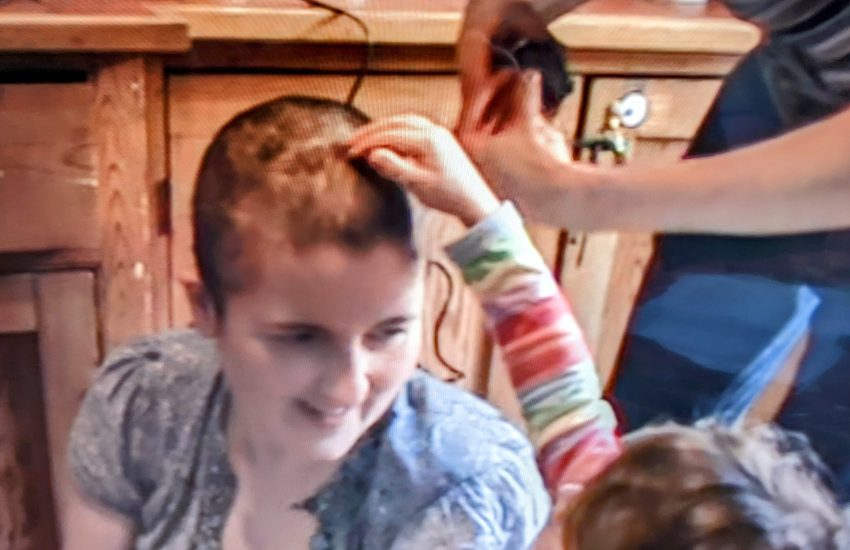Back in February, two people knocked on my door and introduced themselves as new arrivals in the area who’d come to run the local Baptist Church. One of them was an older woman called Ruth, and the other was a fortysomething man.
Now, I love a good theological debate about churchgoing in the UK and my place as a woman within the Church, even when I haven’t had a boring day. So we soon got into it, with Ruth and I going:
Well Ruth, I’d just like to say...
Mmm, Ruth if I could just interject.
and I see what you mean, Ruth, can I just add…?
It was all very entertaining and a bit of a giggle, well Ruth was, the man not so much, as he kept mansplaining obvious bits of the Bible and what feminism means to us, the group of women known as Ruth.
No, you are missing the point, Ruth, I speak as a feminist, the point is blah blah obvious, Jesus, Jesus, women are hidden in the Bible, Hide-and-Seek, no you don’t count as a woman….
… or words to that effect, which got me thinking about all the Marys in the Bible. I now think that the men of history couldn’t be bothered to remember their names: Oh just write down Mary.
Anyway, Ruth and I, Ruth, pressed on as there was definitely a connection between us, or was, until, I mentioned the Apocrypha, the excluded books of the Bible, and Ruth became quite insistent:
I just need to explain that, Ruth, as you don’t understand…
Until, finally:
You are wrong, Ruth. You are wrong.
To which I said, like I always do, that it is time to rewrite the Bible. At this point, my eldest came to rescue me, as otherwise, I might have been arguing all night. So, I thanked Ruth for her invitations to Sunday lunch, Bible study and the rest of it and promptly shut the door. She looked a bit perplexed at my reaction to the hand of friendship she was offering, which made me feel bad, but not as bad as if I had spent any more time with Ruth telling me that I was wrong. Thankfully, I can report that Ruth has recovered as I have seen her since, wandering about the area, I’ve even said hello, but she has no recollection of who I am – no memory of me at all.
Oddzeimers and Grannyburns
She is not alone. I live in an area in which many people have what my girls and I now call Oddzeimers, which is a term that came about after they learnt how my mother no longer remembered who she or I was, and which my youngest thought was called Oldzeimers. However, not everyone is old round here, some of them just behave oddly. We interact with people, frequently, on the playground, in shops, on the street. We spend time with them at social gatherings organised by the church, school, local associations, exchanging pleasantries as we break bread together. But when we see them again and salute them warmly, they have absolutely no idea who we are.
One woman whom I greeted by name, actually stopped me and asked: Why are you saying hello? Do I know you? She did this twice! And, this was after we had shared, on a couple of occasions, over prosecco, long in-depth conversations late into the night about our place in the Universe. Another woman knew me from going to Church every Sunday for four years. She’d invited me to her house to see her art, she loved my little girls. I hadn’t seen her in a while, and she had absolutely no recollection. She denied ever knowing me so emphatically after she asked me my name at a social event last summer that I momentarily questioned my own reality. I saw her just this morning and said Morning but she just looked at me, completely bemused as to why I should be greeting her. She like the others, and like Baptist Ruth, alas I am sorry to report, have Oddzeimers. They just so busy, so stressed, so something, so not present in their lives, that they do not remember their neighbours, unless we are useful to them.
I used to get offended by the Oddzeimers but as my mother used to say, I’m used to it in a glorious passive aggressive statement I now understand more fully as I take my place as an older woman in society. One day I told my girls the story in and amongst the other stories, when I was trying to bring my mum back to life for them, about how I once apologised to my mum, their Grandma, for saying something a bit snippy, and she had said to me: Oh don’t worry, I’m used to it. They laughed and shouted Burn! Grannyburn!
My mum could be quite a muther when she put her mind to it and she wanted me to be one too and spent a lot of time toughening me up. I guess it was her way of keeping me safe. Although it made me really frightened of her, which is something I hadn’t realised until the other day when an old schoolfriend told me how she was bullied at school. I remember people trying to bully me, but I was too afraid of my mother to let it happen. As a small child she would put me outside and tell me that I would get no tea unless I hit the people who had made me cry, and as a teenager, I had to sort out the bullies or not go home. My mother was scarier than any bully, ever. Consequently, as I grew up, and would speak up for myself, I got on my mother’s nerves, and she would say to me: Why can’t you just go somewhere and not cause bother? You would cause a row in an empty house. It seems I had to be all things, but I couldn’t have it all ways. But what a muther I was already, to be able to create a row in an empty house.
This is not how I am raising my daughters. I want them to have confidence to speak up, to take up space and their place whatever they deem it to be in the world, make connections, and to be themselves, but without needing to belligerent unless there is no other alternative and they need something which cannot be found more easily elsewhere. As their muther-mother, I want to be their ally and a safe space. I do not want to add to their stress in an already stressful situation. However, it is difficult to be both vulnerable and a bit of a muther at the same time and I don’t always get it right.
With age and wisdom, I do feel mellower but now I am entering into menopause, I also feel tired and irritable and am starting to care less if I let people know how I really feel in case my feelings make them uncomfortable. And, thanks to living around the Oddzeimers, if people don’t like what I have to say, it’s starting to be okay: I’m used to it, even if I don’t say what I really think and choose to be nice and deny myself, they are not going to remember me anyway so why cause myself pain? I do not want to become an Oddzeimer either. I do not want my mind to be so full of the nonsense of my endless to-do list, so armoured up that I do not notice the moments of connection I have been invited to share. I want to connect to the person in front of me and what’s in their heart as it is equally enriching for me. I want to honour them, their story, and so of course, I would remember that the next time we meet.
Last week it was cold, and as I was lifting things out of my car, ready to finish off a DIY project, dressed in a vest and overalls, an older woman walked by and asked: Aren’t you cold? I said: Menopause. I’m going to save a fortune on heating bills this winter. We both laughed and laughed, and got to sharing what can only be described as muther stories. She told me about her mum who got an NHS letter telling her exactly how ill she is and how long she has left. She pondered it, a bit shocked and then after a long pause, said: Fuck ’em. I’m going to live until I am 100, and might just well do, like a muther, she has already outlived their prognoses.
After I finished my DIY, I went for a coffee and an older woman in the queue next to me asked: Aren’t you cold? I gave the same answer: Menopause. She looked around the cafe, and tried to shush me, to stop me talking about my body, and its societally perceived failures. I get it. We are not allowed to grow old, to stop being young, sexy, and attractive to the male, patriarchal gaze, or at least if we fade away, we should do it silently, and not be difficult. Though from my experiences, grey hair makes people stare even more. She said in her snooty RP tones that I shouldn’t overshare – a shocking difference to my new friend with whom I laughed and shared muther stories but, I understand. I sometimes struggle too. Who am I if I am no longer young, sexy and fertile in a society which values sexy and young (though I have a theory about that), nice women above all else?
The negative animus
Thankfully, last night, I listened to a lecture by the indomitable Anne Baring, who cowrote The Myth of the Goddess: Evolution of an Image , which is about how imagery of deity changed from feminine to masculine around 2000 BCE and gave us the Jungian negative animus which is the internal critic all women have, as ingrained into us by society. It is what causes women to denounce themselves and each other as too loud, too slutty, too fat, when we don’t conform to acceptable norms. A society which demotes us to second class citizens, and tells us that our lives as women have no meaning when we are unable to bear children or look young and attractive.
Baring spoke with a wisdom of her 91 years, like a muther, as she explained what had happened through time and said that now it is time for us to reclaim our place and do the work we came to do, whatever that means to us. We do this by following our hearts, for all our lives, regardless of our ages as we all have a contribution to make, even though the patriarchy says we don’t. She was inspirational and is a role model for women everywhere.
Then, my girls got us to watch the videos of when they were babies. Normally, I avoid them, as I knew we would come across the video from which the above picture is taken. In it, my husband cuts off my beautiful long black hair (which we posted to a children’s wig charity), as the first round of chemotherapy was already making it fall out and a shaved head made it easier for me to bear.
Watching the video was like my own technological version of what the Vedic tradition calls Chidakasha, which is a meditation practice that focuses on being a watcher the inner space where we visualise our lives in a detached way, whilst experiencing the love and bliss of our true inner self. Perhaps it is the passage of time, or perhaps it is the gratitude I feel to be older and here, but for the first time I did just that. Instead of the fear and pain I once experienced, I felt awe and love for the younger Ruth sitting there, who is terribly sad that she is losing her crowning glory, sore from surgery, and weak from chemotherapy, and yet in that moment, she is comforted and comforting as her baby girls rub her head in delight at its spikeyness. She is a total muther.
Hierarchical, patriarchal and not life-giving
But back in that night, as my husband shaved my head, he said that he needed some community, as we didn’t know what was going to happen to me. He needed some support. So, I put on my wig, and we went to our local church.
The first woman who greeted us through the door told us that if we came to get into the good church school then we were too late as we would have already had to attend church for two years and volunteer for Sunday School. Funnily enough, I saw this woman for the first time in ages, back in February this year. She has been on her own cancer journey and wanted my contact details – though she hasn’t needed them for the last seven years – as she was worried about the results of her BRCA gene testing. I couldn’t say no. I would have wanted someone there for me, instead of being surrounded by people who wanted me to suffer in silence.
Anyway, she was not atypical of the church we attended which was full of Oddzeimers too who don’t ever remember me or my life and sometimes that’s a bonus. People there found us annoying as we didn’t pull our weight in the busyness of that church. We didn’t go there to pretend we were religious and volunteery to get into school. We went because we needed something bigger than ourselves, we needed meaning, we needed hope and I wanted my girls to know how to pray, which even got on the vicar’s nerves, as he wasn’t one for praying and such like.
Then one day, the girls started asking Where are all the women apostles and saints? To which I had to say to their little expectant faces: There is none. We don’t count. It was bad enough to say that but in a church where they were taught by people only pretending to believe in God, it felt even worse, so we started going to another church, one where we could be ourselves and talk to like minded people about questions such as: What is the meaning of it all? What/who is God? You know: religious stuff. In spite of this lovely community, something in me had already changed and when a male minister took over and ignored all the women unless he wanted something doing, which is when he spoke to us, some ancient rage awoke in me. Finally, when my mother died, I realised that nothing any man in a dress or dog collar, or any books of the Bible could say would ever comfort me, and I never went back to church.
If asked, I wouldn’t have been able to put into words how I felt, and still wasn’t able until a couple of weeks ago, when I listened to a podcast which featured Christine Valters Paintner. She runs Abbey of the Arts a community based on the monastic traditions of prayer and contemplation, but not based in the Church, which she finds to be: Hierarchical, patriarchal and not life-giving.
I found this phrase, so clarifying, so true, that I have repeated it ever since, like a mantra. Then, Valters Paintner went on to talk about the female Christian mystics including Hildegarde de Bingen who after menopause basically turned into a total Muther as she entered into the richest period of her life. She set up two monasteries, had mystical visions, composed music, wrote texts, and stood up to the patriarchy in the mellow muther ways until her visions received the Pope’s blessing. At which point, I am sure she was not worrying about whether she was young, sexy and fertile enough, silent enough or relevant enough, she had after all started out as nun, and didn’t need the Pope’s blessing to follow her heart or write:
We cannot live in a world that is not our own, in a world that is interpreted for us by others. An interpreted world is not a home.
Nine centuries later, her words still resonate, as does her example of how to live out loud in a world that does not value older women. Thankfully though, today there are many women, who share their stories as they live rich lives as older women. I am so grateful and originally began this blog to wrestle into shape all the notes I have made on the books I have read by them – a wide range of amazing women. However, 2000 words in, I am just warming up to my theme, so may write another blog, another time, about the things I have understood.
In the meantime, I am no longer feeling irrelevant or wrong, as I age. I am filled with gratitude to be here, to be entering into mutherhood, menopause, and I trust the promise of some mysticism and richness, as I follow my heart to experience the numinous as the theologians of old used to do, long before gender got involved:
Accustomed long to meditating on the whispered chosen truths. I have forgot all that is said in written and in printed books. Accustomed long to application of each new experience to my own spiritual growth, I have forgot all creeds and dogmas. Accustomed long to know the meaning of the Wordless, I have forgot the way to trace the roots of verbs, and source of words and phrases.
Tenzin Palmo
Fewer words, more feelings. Amen. Ay women. And, Ay muthers everywhere.






